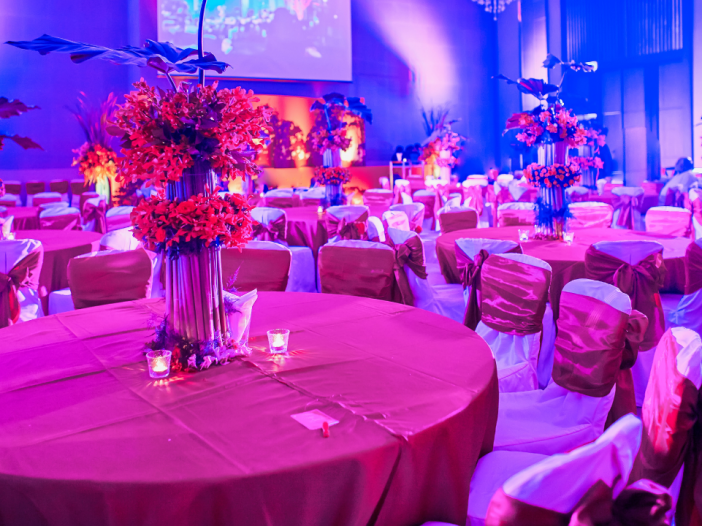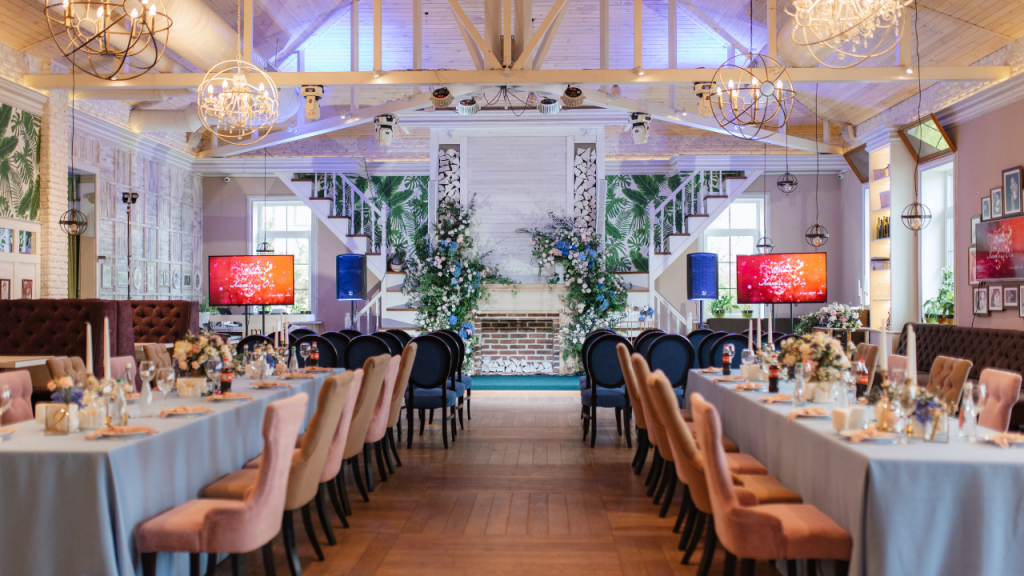
Selecting the right banquet hall is one of the most important decisions when planning an event. From wedding, corporate function, or social gathering, the venue’s ambiance and amenities play a crucial role in creating a memorable experience. With countless options available, finding the ideal banquet hall can be overwhelming. Let’s take a look at the key things to consider when choosing the perfect venue, ensuring that your event is successful, stress-free, and enjoyable for all attendees.
What are the Things to Consider When Choosing the Perfect Banquet Hall for my Event?

1. Location
Accessibility
The location of the banquet hall can significantly impact your event’s attendance. Choose a venue that is easy for guests to reach, with proximity to major roads, public transportation, and parking facilities. A conveniently accessible venue will not only enhance your guests’ experience but also reduce travel-related stress.
Ambiance
The venue’s surroundings set the tone for your event. Consider how the ambiance of the location matches your event’s them. The right setting can enhance the atmosphere and make your event more memorable.
2. Capacity and Layout
Guest List Size
Determining the number of attendees is crucial when selecting a banquet hall. A space that is too large can feel empty, while a venue that’s too small can create a cramped atmosphere. Aim for a hall that offers comfortable movement and ample space for seating, a dance floor, or other activities.
Layout Flexibility
In addition to capacity, the layout plays a vital role in setting up the event venue. Different types of events, such as a sit-down dinner, a cocktail reception, or a seminar, require different arrangements. Choose a banquet hall that offers flexibility with various seating styles, like round tables for dining, theater-style for presentations, or open spaces for networking. This will help tailor the event’s flow to your specific needs.
Additional Areas
Additional spaces within the banquet hall can be valuable assets. Look for:
- Cocktail Reception Areas: Ideal for pre-event mingling.
- Breakout Rooms: Useful for workshops or smaller meetings during corporate events.
- Outdoor Spaces: Scenic gardens or patios for ceremonies or photo opportunities.
- Preparation Rooms: Particularly helpful for weddings or events that require a backstage area.
- Storage Facilities: Convenient for keeping decorations or equipment before and after the event.
3. Amenities and Services
In-House Services vs. External Vendors
Many banquet halls offer in-house services, including catering, decoration, and audiovisual equipment. These comprehensive packages can simplify planning by allowing you to work with a single vendor. However, if the venue permits external vendors, you may have more flexibility to choose your preferred service providers, potentially leading to cost savings.
Technology and Equipment
For corporate events or functions that involve presentations, modern technology is a must. Ensure the venue is equipped with reliable sound systems, projectors, screens, and Wi-Fi. Technical support from on-site staff can also help avoid issues during the event.
Lighting Options
Lighting dramatically affects the ambiance of your event. Look for a banquet hall that offers customizable lighting settings, including programmable options, dimmable lights, or specialty features to enhance the event’s atmosphere.
4. Accessibility for All Guests
Geographical Convenience
Choosing a venue that is centrally located increases the likelihood that guests will attend. If you expect attendees from out of town, consider the venue’s proximity to hotels and public transportation.
Parking Availability
Ample parking can make a big difference in guest convenience. Verify if the banquet hall has enough on-site parking or nearby alternatives. Also, consider any parking fees or restrictions that may apply.
ADA Compliance
Ensuring the banquet hall meets ADA (Americans with Disabilities Act) standards is essential for creating an inclusive event. The venue should have wheelchair accessibility, designated parking, and suitable restroom facilities to accommodate guests with disabilities.
5. Budget Considerations
Venue Rental Fees
Start by understanding what the rental fee includes. Some banquet halls offer packages that cover tables, chairs, and linens, while others charge these separately.
Additional Costs
Hidden fees, such as setup and teardown costs, security deposits, insurance, or overtime charges, can impact your budget. Make sure to clarify these expenses before signing a contract.
Catering and Beverage Packages
If in-house catering is available, evaluate the menu and pricing options. Determine whether a buffet, plated meal, or cocktail reception fits your budget, and inquire about beverage packages.
Service Charges and Gratuities
Many banquet halls apply a service charge, usually around 20% of the catering total. Be sure to factor this, along with gratuity policies, into your budget planning to avoid unexpected expenses.
How much does it Cost to Book a Banquet Hall?
According to peerspace, renting a banquet hall directly from the property costs anywhere from $200 to $3,800 per hour, with an average cost of about $1,200 per hour. Of course, this disparity is based on several factors.
Conclusion
Choosing the perfect banquet hall for your event requires careful planning and consideration of multiple factors, such as location, capacity, amenities, and budget. Ensuring that the venue aligns with your event’s theme, accommodates your guests comfortably, and fits within your financial plan will greatly enhance the success of the occasion.








